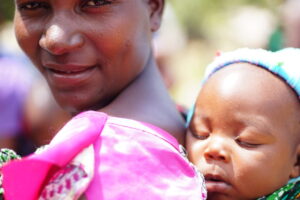World Health Day feature post by Tanya Salewski, Alinea Project Director for Global Health and Gender Equality
Mwanza Region in Tanzania’s western Lake Zone has amongst the highest burden of maternal and childhood mortality and morbidity countrywide. Poor communication and disrespectful treatment by health workers can be a barrier that prevents pregnant women from seeking essential care at a health facility – this is just one example of how gender inequality shapes the experiences and perceptions of patients seeking and providers delivering health services in Tanzania and around the world.

Photo credit: University of Calgary
Often, clinicians do not see gender as “relevant” to clinical practice, or assume maternity care is by definition gender-responsive because it focuses on women. “I treat each pregnant and delivering woman according to her need – it has nothing to do with gender equality,” is a phrase I often heard while working in Mwanza as Field Manager for the Mama na Mtoto Project, which means “Mother and Baby” in Swahili.
We know from the wealth of information in literature combined with extensive program implementation experience that health status and access to quality health services are profoundly gendered – creating a clear link between the issues of gender equality and health inequity.
On World Health Day 2021, I am taking the opportunity to share my experience with the Mama na Mtoto Project and how gender-responsive care can play a key role in addressing equity in healthcare.
Funded by Global Affairs Canada and under contract to the University of Calgary, Alinea led field implementation of the Mama na Mtoto Project. Between 2016 and 2020, we worked in two districts with local governments and academic partners to build capacity of health management teams and health workers to improve the quality of services for mothers and babies, including antenatal care, delivery, postnatal and essential newborn care.
At the outset, many clinicians resisted the idea of integrating a session on gender equality into hands-on clinical training – they did not want to distract from transmitting essential, life-saving skills to frontline staff, and saw gender content as abstract and theoretical. In response, our project team integrated tangible gender issues into clinical simulation scenarios to help health workers identify what disrespectful care looks like, its impact on quality of care and how to deliver equity-focused care at their facilities.

Photo Credit: University of Calgary
Based on the positive response, we developed a two-day training workshop for health workers from selected rural facilities to work through a process of self-reflection, situation analysis and hands-on planning to apply a gender equality approach in their care delivery settings. The workshops allowed space for participants to share their experiences in order to identify and understand the stresses and issues that drive rude, disrespectful or even abusive behaviour. We focused on understanding the various dynamics at the interface between patient and provider based on examples from lived experience, as well as feedback gathered from women in focus group discussions. We found poverty, age, ability, education, ethnicity and language – layered with gender – all contribute to the power imbalance between patient and provider, and can create an environment that normalizes disrespect of pregnant and delivering women.
Participants identified and planned specific actions they could take in their facilities and the support they would need to practice equitable care and respectful communication. Followed-up with mentoring and on-the-job support, this process saw health workers develop the ability to express the links between the gender-responsive care learnings and delivery of effective and respectful care, improved relationships between patients and providers and, importantly, increased use of health facilities by expectant mothers.
We found that reframing training content on gender equality as “dignified and respectful care” created an energizing, relevant and acceptable entry point to engage health workers in meaningful conversation and concrete action on gender, equity and human rights. Through the Mama na Mtoto Project, we supported more than 30 health facilities to improve communication and provide gender-responsive care to help mothers and babies in Tanzania access quality health services when and where they need them.
